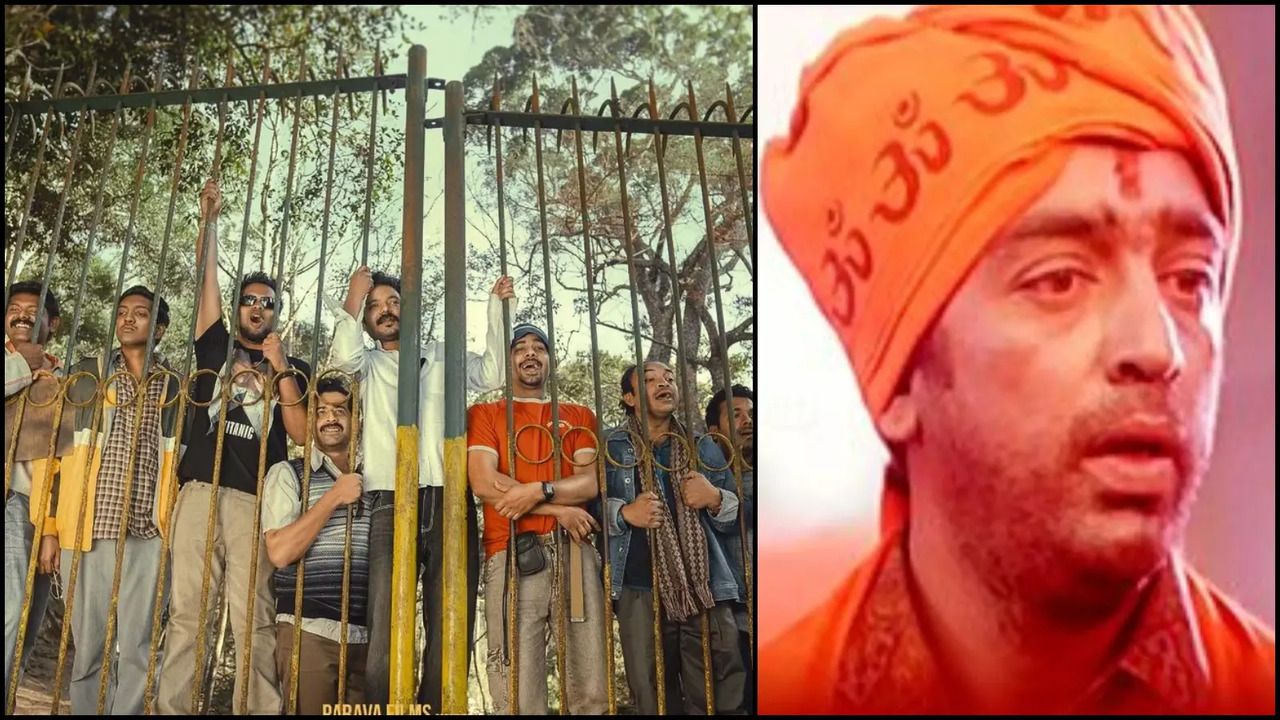
How Manjummel Boys Ties Its Thread With Kamal Haasan's 1991 Film Gunaa
When Kuttan (essayed by Soubin Shahir) carries blood-soaked Subhas (essayed by Sreenath Basi) out of the pit in Guna cave and his friends come towards them and cry their hearts out in relief, director Chidambaram beautifully places Gunaa's iconic song Kanmani Anbodu, which goes, "My wound will heal itself, but you're too tender for it, honey. As I struggled to express my love, my eyes swelled up. My tears stopped when I realised that my grief would upset you." At that moment, the whole theatre screamed and our eyes welled up.
Two weeks ago, on February 22, Manjummel Boys arrived in theatres and since then, the weekends have seen theatres brimming with audiences. The cinema halls are consistently packed for all the right reasons, not only in the South but also in the North.
While the film is labelled as a survival thriller, it is more than that. After watching, we realised, it stands out as one of the most compelling friendship tales we've seen in a while. A narrative beautifully presented by the director paying tribute to Kamal Haasan's Gunaa. Through, this piece, we are going to dissect the instances of how Manjummel Boys tied its thread with Gunaa and let us tell you, it's not spoiler-free!
With much anticipation, we take our seats and suddenly, the opening credits begin, featuring sketches of Kamal Haasan and Roshini from Gunaa, accompanied by the classic song Kanmani Anbodu. At that moment, it becomes evident – we are in for an experience like never before.
As we move forward, the story begins with a group of 11 boys hailing from Manjummel, a town in Kochi, making an unexpected appearance at a wedding party. Each of them leaves a lasting impression, all credits goes to the distinctive traits assigned to their characters. Subsequently, they collectively decide to embark on a group trip to Kodaikanal.
While en route to Kodai, three friends visit a shop to purchase a CD for the car ride and ask the shopkeeper, "We're on a trip to Kodaikanal. Give us something with a drunken vibe." He gives them a CD with Kamal Haasan hits and quips, "This will warm you like a drink as you climb the hills in the cold."
The cover of the CD features the poster of Kamal Hasaan's Gunaa. The tone of the film changes as they decide to visit the Guna Cave also known as Devil's Kitchen, which was made famous by Kamal Haasan in the 1991 movie.
Drawing inspiration from the legend himself, they collectively head towards the cave where the Gunaa movie was actually shot (according to one of the friends). However, their plans take an unforeseen turn when one of them accidentally falls into a 900-ft pit. Despite desperate calls for assistance, involving the police and locals, hope seems bleak. At this point, his friends decide they would not go back — without rescuing their friend, Subhas, from the depths of the pit.
After several attempts, Kuttan (Subhas's friend) finally rescues him, and director Chidambaram inserts Kanmani Anbodu song, turning it into a friendship anthem from a timeless love song.
The track from Kamal Haasan's 1991 film continues to play throughout the initial section of Manjummel Boys, creating anticipation as if something significant is about to unfold. As you immerse yourself in the picturesque view of Kodaikanal (known as Princess Of Hill Station), the melody gradually diminishes and comes back at the end. It beautifully sums up and that's the beauty of this film. Each element comes back into the picture, when you least expect it, delivering satisfying payoffs.
We would like to end it with a thought from the movie and how it connected with the song. In an early scene in Manjummel Boys, Prasad (played by Khalid Rahman) and Subash engage in a casual conversation about faith. Prasad is a believer, while Subash holds a different perspective. When Subash (Sreenath Bhasi) inquires about Prasad's perception of God, he responds, "Like a light from above." Little did they know, hours later, Subash would find himself trapped in a pit and indeed encounter a light from above.
During the climax scene, when Subhas is rescued, we hear, "Manithar unarndha kolla, Idhu manitha kaadhal alla, Adhaiyum thaandi punithamaanathu."
("This is no mortal love for humans to understand. It is much beyond, real divine").















